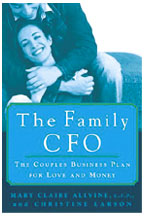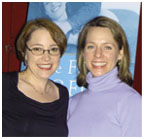February 25, 2004: Reading Room
|
Christine Larson ’90, left, and Mary Claire Allvine ’90 advise readers to treat their family finances like a business. (courtesy Christine Larson ’90) |
Love
and money
Mary Claire Allvine ’90 and Christine Larson ’90 teach couples
how to organize their finances
A certified financial planner in Chicago, Mary Claire Allvine ’90 periodically fields calls from Princeton friends asking for advice on handling student-loan and credit-card debt, or whether to buy a house. When her former roommate Christine Larson ’90 and Larson’s husband, Richard Rojo ’91, were merging their finances and fighting for the first time, Larson called on Allvine for help managing their money peacefully. Larson, a journalist, thought Allvine’s advice for developing a family business plan was so useful that the two decided to put it in writing. In The Family CFO: The Couple’s Business Plan for Love and Money, published by Rodale in January, they show readers how to manage cash flow and investments, divide responsibilities, prioritize goals, and focus on realizing dreams. PAW’s Katherine Federici Greenwood spoke with the authors.
 What
must couples do first to get their finances organized?
What
must couples do first to get their finances organized?
Larson: Accept the idea that your family is a small business. You have goals. You have limited resources and unlimited desires. You generate revenue. You make investments. You have assets and liabilities. So if you start treating it like a business and using business tools and terms . . . then you can put all that emotional energy into your goals and your dreams.
Allvine: Next, couples have to get their priorities in order. We suggest couples divide a stack of index cards, and separately write down one financial dream or goal per card. Those can be as simple as buying a car next year or as significant as having that third child or changing careers. Then the couples need to say, this card is more important than this card. Once they do that, the money will fall into place because the goal is to apply their assets and cash flow in proportion to those priorities.
What’s the most common problem couples face in managing their money?
Larson: Finding time for finance — not just paying the bills, but looking at their spending patterns every month, understanding how much comes in and goes out, and tracking their investments. One way to solve that problem is to simplify your finances. Use the Internet for online banking and bill paying, use money software like Quicken or Micro-soft Money, and try to have as few financial institutions and as few accounts as possible. We recommend paring down to one bank and just one or two brokerages or investment companies.
Christine, why did you and Rich leave high-paying jobs in New York for less lucrative positions – a move, you note in the book, that decreased your family’s net worth?
Larson: In New York, I had helped start up a Web company for a couple
of years. Rich had a pretty high-powered advertising job. We decided that
we wanted to devote our careers to the things we really love. For me it
was writing and for him, the arts. We realized that a high-stress lifestyle
in New York wasn’t really going to work with our dreams. Rich found
a job helping to start up a tiny museum in Northern California. I quit
my job and started freelancing full-time. We rebuilt our lives doing what
we loved. ![]()
Book Shorts
 Seeing Arabs Through
an American School: A Beirut Memoir, 1998-2001 — ROBERT F. OBER
JR. ’58. (Xlibris). A memoir of the author’s stint as president
of an American independent school, International College, in Beirut, Lebanon,
serving 3,500 Arab students from preschool through high school. Ober also
discusses the challenges he faced leading a secular school in a non-secular
nation. Ober served in the U.S. Foreign Service until 1987.
Seeing Arabs Through
an American School: A Beirut Memoir, 1998-2001 — ROBERT F. OBER
JR. ’58. (Xlibris). A memoir of the author’s stint as president
of an American independent school, International College, in Beirut, Lebanon,
serving 3,500 Arab students from preschool through high school. Ober also
discusses the challenges he faced leading a secular school in a non-secular
nation. Ober served in the U.S. Foreign Service until 1987.
 The Smartest
Guys in the Room: The Amazing Rise and Scandalous Fall of Enron —
PETER ELKIND ’80 and Bethany McLean (Portfolio). Using private e-mails,
court records, board minutes, and interviews, the authors explore Enron’s
leaders’s shady finances and corrupt corporate culture. What brought
Enron down, they write, was more complex than simple thievery. The company
was run by people who thought they were the smartest guys in any room,
but who were bad business managers. Elkind and McLean are senior writers
at Fortune.
The Smartest
Guys in the Room: The Amazing Rise and Scandalous Fall of Enron —
PETER ELKIND ’80 and Bethany McLean (Portfolio). Using private e-mails,
court records, board minutes, and interviews, the authors explore Enron’s
leaders’s shady finances and corrupt corporate culture. What brought
Enron down, they write, was more complex than simple thievery. The company
was run by people who thought they were the smartest guys in any room,
but who were bad business managers. Elkind and McLean are senior writers
at Fortune.
 Ancient Europe,
8000 B.C. to A.D. 1000: An Encyclopedia of the Barbarian World —
edited by PETER BOGUCKI and Pam J. Crabtree (Scribner’s). Part of
a world-history series, these two volumes cover prehistoric people in
Europe after the Ice Age, starting with hunters and gatherers and ending
with the Vikings. In these articles, archaeologists and historians also
chronicle the emergence of cities and states. Bogucki is associate dean
for undergraduate affairs at the School of Engineering and Applied Science.
By Lucia S. Smith ’04 and K.F.G.
Ancient Europe,
8000 B.C. to A.D. 1000: An Encyclopedia of the Barbarian World —
edited by PETER BOGUCKI and Pam J. Crabtree (Scribner’s). Part of
a world-history series, these two volumes cover prehistoric people in
Europe after the Ice Age, starting with hunters and gatherers and ending
with the Vikings. In these articles, archaeologists and historians also
chronicle the emergence of cities and states. Bogucki is associate dean
for undergraduate affairs at the School of Engineering and Applied Science.
By Lucia S. Smith ’04 and K.F.G.

